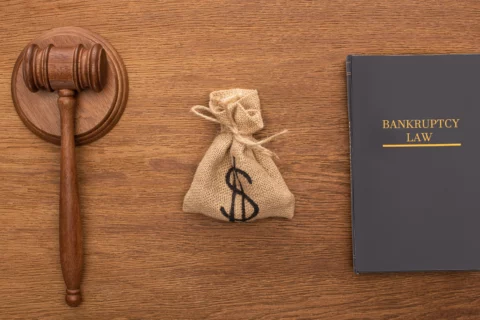When Chapter 13 Bankruptcy Is Better Than Chapter 7 Bankruptcy
Resolve your debts through Chapter 13 bankruptcy
When faced with insurmountable debts, you might consider filing for bankruptcy to get a fresh start. But one might wonder, how do you choose which chapter to file? Is Chapter 7 better than Chapter 13? Or when is Chapter 13 bankruptcy better than Chapter 7 bankruptcy? In this article, with the help of an experienced bankruptcy attorney, you will learn the difference between Chapter 7 and Chapter 13 bankruptcy, when Chapter 13 bankruptcy is better than Chapter 7 bankruptcy, the eligibility requirements for filing Chapter 13, and the pros and cons of Chapter 13 bankruptcy.
If you are still searching for the right bankruptcy lawyer in Illinois, look no further than Cutler & Associates, Ltd. Our experienced bankruptcy attorney will help you understand the overall concept and provide a holistic and personalized legal approach. We know that facing debt problems can be absolutely frustrating. With our help, you could eliminate your debts! Get a free initial consultation now!
Chapter 7 Bankruptcy vs. Chapter 13 Bankruptcy
Determining the differences between Chapter 7 and Chapter 13 bankruptcy should be your first step. Below are their notable differences:
Chapter 7 Bankruptcy
Once you file for Chapter 7 bankruptcy, your creditors will no longer be allowed to make phone calls, and you can discharge your debts within three to four months from the date you filed. While it is true that you might have to sell some of your property to pay your unsecured creditors, you can still, however, retain some of your personal belongings.
There is no specific debt threshold required for eligibility in this type of filing. However, Chapter 7 bankruptcy is typically sought by individuals who have unsecured debts, lack a regular income to cover their living expenses, have no non-dischargeable debts (like alimony and spousal support), and are unable to commit to a repayment plan in the near future. If you’re considering alternatives, it’s advisable to consult with a bankruptcy attorney for guidance and assistance.
Chapter 13 Bankruptcy
If you do not have substantial debt but have disposable income, our competent bankruptcy lawyer would suggest considering Chapter 13 bankruptcy. In this chapter, you will have a repayment plan tailored to the amount you can afford to pay.
Regardless if your creditors object to the terms, they can no longer do anything once the bankruptcy court approves it. In contrast to Chapter 7 bankruptcy, when you opt for Chapter 13, you can lower both the interest rate and the outstanding balance on your car loan.
Another feature of Chapter 13 bankruptcy is that you don’t have to surrender your non-exempt properties since your creditors will be compensated. Once you have fully paid off your debts within the three- or five-year repayment plan, all your debts are eliminated under this filing.
When is Chapter 13 Bankruptcy Better Than Chapter 7 Bankruptcy?
Chapter 13 bankruptcy can be a better option than Chapter 7 bankruptcy in the following situations:
- You have too much income to qualify for Chapter 7: The income limits for Chapter 7 bankruptcy are based on your state’s median income. You may not qualify for Chapter 7 bankruptcy if your income is above the median.
- You have property you want to keep: In Chapter 7 bankruptcy, your non-exempt assets may be sold to pay off your creditors. If you have property that you want to keep, such as your home or car, Chapter 13 bankruptcy may be a better option.
- You want to catch up on your mortgage or other secured debt payments: In Chapter 13 bankruptcy, you can create a repayment plan to catch up on your mortgage or other secured debt payments. That can help you avoid foreclosure or repossession.
- You have debts that can’t be discharged in Chapter 7: Some debts, such as child support and student loans, cannot be discharged in Chapter 7 bankruptcy. In Chapter 13 bankruptcy, you may be able to repay these debts over time.
What are the Eligibility Requirements for filing a Chapter 13 Bankruptcy?
To be eligible to file for Chapter 13 bankruptcy, you must meet the following requirements:
- You must be an individual or a married couple filing jointly: Chapter 13 bankruptcy is exclusively available to individuals and married couples filing jointly. Conversely, corporations and limited liability companies (LLCs) are not eligible for Chapter 13 relief; instead, they must opt for Chapter 11 bankruptcy.
- You must have a regular income: To qualify for Chapter 13 bankruptcy, you must have a reliable source of income that allows you to make monthly payments under a repayment plan. This plan will be designed to help you gradually pay off your debts over a period of three to five years.
- Your debts must be less than the Chapter 13 debt limits: Chapter 13 bankruptcy imposes specific debt limits. These limits are adjusted periodically to account for inflation.
- You must have no previous Chapter 7 discharge: If you received a Chapter 7 discharge within the past four years, you may not be eligible for Chapter 13 bankruptcy. Timing is crucial when considering bankruptcy options.
- You must complete credit counseling before you file: It is a must to complete a credit counseling course before you file for bankruptcy. The credit counseling course will teach you about bankruptcy and help you develop a budget.
In conclusion, understanding the eligibility requirements for filing Chapter 13 bankruptcy is vital when seeking debt relief. These criteria may vary based on your specific circumstances and the latest regulations. It’s highly advisable to consult with a skilled bankruptcy lawyer who can provide tailored guidance based on your unique financial situation and the most current legal requirements.
The Pros and Cons of Chapter 13 Bankruptcy
Chapter 13 bankruptcy is a reorganization bankruptcy that allows you to keep your property and catch up on your debt payments over a period of time. Here are some of the pros and cons of Chapter 13 bankruptcy:
Pros
- You can keep your property: In Chapter 7 bankruptcy, your non-exempt assets may be sold to pay off your creditors. In Chapter 13 bankruptcy, you can keep your property as long as you make the required payments under your repayment plan.
- You can catch up on your debt payments: If you are behind on your debt payments, Chapter 13 bankruptcy can help you catch up. You will create a repayment plan that will pay off your debts over a period of time.
- You can get a fresh start: Your remaining debts will be discharged after you complete your repayment plan. That means that you will no longer be legally obligated to pay them.
Cons
- It takes longer than Chapter 7 bankruptcy: Chapter 13 bankruptcy typically takes three to five years to complete. Chapter 7 bankruptcy can be completed in three to six months.
- You have to make monthly payments: In Chapter 13 bankruptcy, you must make monthly payments to your creditors. These payments will be based on your income and expenses.
- Strict Budgeting: Adherence to a court-approved payment plan and budget can limit financial flexibility during repayment.
File Chapter 13 Bankruptcy Today!
It doesn’t mean you are weak if you need assistance filing for bankruptcy. Seeking advice from an experienced bankruptcy lawyer is one of the most effective ways to achieve a successful bankruptcy filing. In other words, hiring Cutler & Associates, Ltd. is a wise decision.
Don’t hesitate to contact our skilled bankruptcy attorneys. With more than 30 years of combined experience, we can help you rebuild your life through bankruptcy as a financial legal solution. Get a free initial consultation today!


